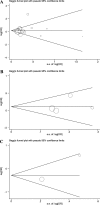Shorter GGN Repeats in Androgen Receptor Gene Would Not Increase the Risk of Prostate Cancer
- PMID: 28279145
- PMCID: PMC5616035
- DOI: 10.1177/1533034616673272
Shorter GGN Repeats in Androgen Receptor Gene Would Not Increase the Risk of Prostate Cancer
Abstract
The association between the polymorphic GGN repeat in androgen receptor gene and prostate cancer susceptibility has been studied extensively. But the results of these polymorphisms with prostate cancer risk remain inconclusive. Previous meta-analysis showed short GGN repeats (≤16 repeats) had high risks for prostate cancer compared with longer GGN repeats (>16 repeats). Many studies have been published since the release of the previous meta-analysis. Here, we conducted an updated meta-analysis to demonstrate whether short repeats have higher risks for prostate cancer compared to long repeats. Five databases (PubMed, EMBASE, Cochrane Library, The China National Knowledge Infrastructure, and Web of Science) were last searched until January 1, 2016. Random- or fixed-effects model was performed based on the heterogeneity among studies. The potential publication bias was assessed via Begg funnel plot and Egger regression test. Twelve out of 157 studies were extracted. The result indicated that there was no significant difference between short repeat group and long repeat group in the overall analysis ( I2 = 80.6%, P = .000, odds ratio = 1.31, 95% confidence interval: 0.93-1.83). There was no association between the length of GGN repeats and the occurrence of prostate cancer in both Caucasian and African American ( I2 = 6.7%, P = .359, odds ratio = 1.11, 95% confidence interval: 0.94-1.32; and I2 = 74.1%, P = .050, odds ratio = 0.963, 95% confidence interval: 0.36-2.58). Our result demonstrated that a shorter GGN repeat polymorphism cannot increase the risk of prostate cancer compared to the longer GGN repeats. That's different with previous meta-analysis.
Keywords: GGN repeats; androgen receptor; gene; meta-analysis; prostate cancer.
Conflict of interest statement
Figures





Similar articles
-
How strong is the association between CAG and GGN repeat length polymorphisms in the androgen receptor gene and prostate cancer risk?Cancer Epidemiol Biomarkers Prev. 2004 Nov;13(11 Pt 1):1765-71. Cancer Epidemiol Biomarkers Prev. 2004. PMID: 15533905 Review.
-
Polymorphic CAG and GGN repeat lengths in the androgen receptor gene and prostate cancer risk: a population-based case-control study in China.Cancer Res. 2000 Sep 15;60(18):5111-6. Cancer Res. 2000. PMID: 11016637
-
Androgen receptor gene polymorphisms and risk of prostate cancer: a meta-analysis.Sci Rep. 2017 Jan 16;7:40554. doi: 10.1038/srep40554. Sci Rep. 2017. PMID: 28091563 Free PMC article.
-
Polymorphic repeats in the androgen receptor gene in high-risk sibships.Prostate. 2001 Aug 1;48(3):200-5. doi: 10.1002/pros.1098. Prostate. 2001. PMID: 11494335
-
[Correlation of androgen receptor CAG repeats with the risks of benign prostatic hyperplasia and prostate cancer: a meta-analysis].Zhonghua Nan Ke Xue. 2014 Feb;20(2):172-6. Zhonghua Nan Ke Xue. 2014. PMID: 24520673 Chinese.
Cited by
-
Association Between the Asp312Asn, Lys751Gln, and Arg156Arg Polymorphisms in XPD and the Risk of Prostate Cancer.Technol Cancer Res Treat. 2017 Dec;16(6):692-704. doi: 10.1177/1533034617724678. Epub 2017 Aug 11. Technol Cancer Res Treat. 2017. PMID: 28797198 Free PMC article.
-
Racial disparity in prostate cancer in the African American population with actionable ideas and novel immunotherapies.Cancer Rep (Hoboken). 2021 Oct;4(5):e1340. doi: 10.1002/cnr2.1340. Epub 2021 Feb 17. Cancer Rep (Hoboken). 2021. PMID: 33599076 Free PMC article. Review.
-
Steroid Receptors in Breast Cancer: Understanding of Molecular Function as a Basis for Effective Therapy Development.Cancers (Basel). 2021 Sep 24;13(19):4779. doi: 10.3390/cancers13194779. Cancers (Basel). 2021. PMID: 34638264 Free PMC article. Review.
-
The effect of pathological fractures on the prognosis of patients with osteosarcoma: a meta-analysis of 14 studies.Oncotarget. 2017 Aug 21;8(42):73037-73049. doi: 10.18632/oncotarget.20375. eCollection 2017 Sep 22. Oncotarget. 2017. PMID: 29069847 Free PMC article.
-
Molecular mechanisms involving prostate cancer racial disparity.Am J Clin Exp Urol. 2017 Nov 9;5(3):34-48. eCollection 2017. Am J Clin Exp Urol. 2017. PMID: 29181436 Free PMC article. Review.
References
-
- Zhou QX, Tang JQ, Zhao F, Wei FL, Huang Y. The P275A polymorphism in the macrophage scavenger receptor 1 gene and prostate cancer risk: a meta-analysis. Asian Pac J Cancer Prev. 2015;16(13):5407–5413. - PubMed
-
- Center MM, Jemal A, Lortet-Tieulent J, et al. International variation in prostate cancer incidence and mortality rates. Eur Urol. 2012;61(6):1079–1092. - PubMed
-
- Bloom JR, Stewart SL, Oakley Girvan I, Banks PJ, Chang S. Family history, perceived risk, and prostate cancer screening among African American men. Cancer Epidemiol Biomarkers Prev. 2006;15(11):2167–2173. - PubMed
Publication types
MeSH terms
Substances
LinkOut - more resources
Full Text Sources
Other Literature Sources
Medical

